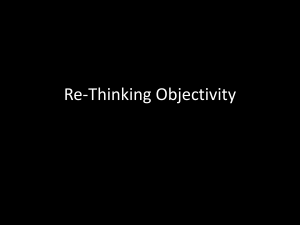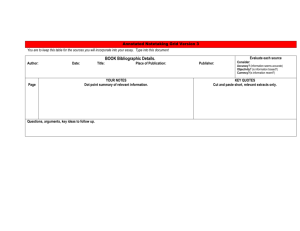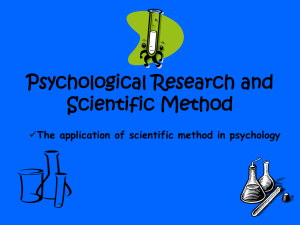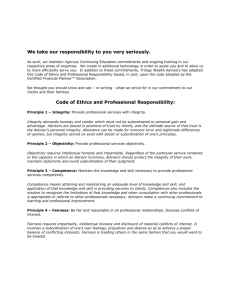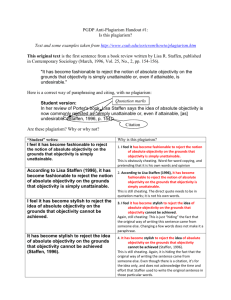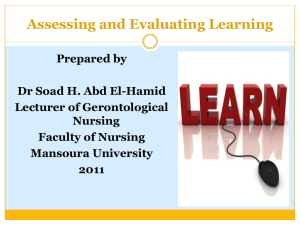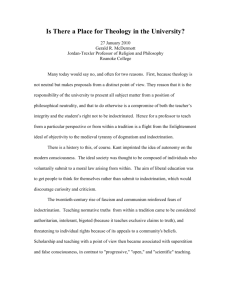lack od obj 1
advertisement
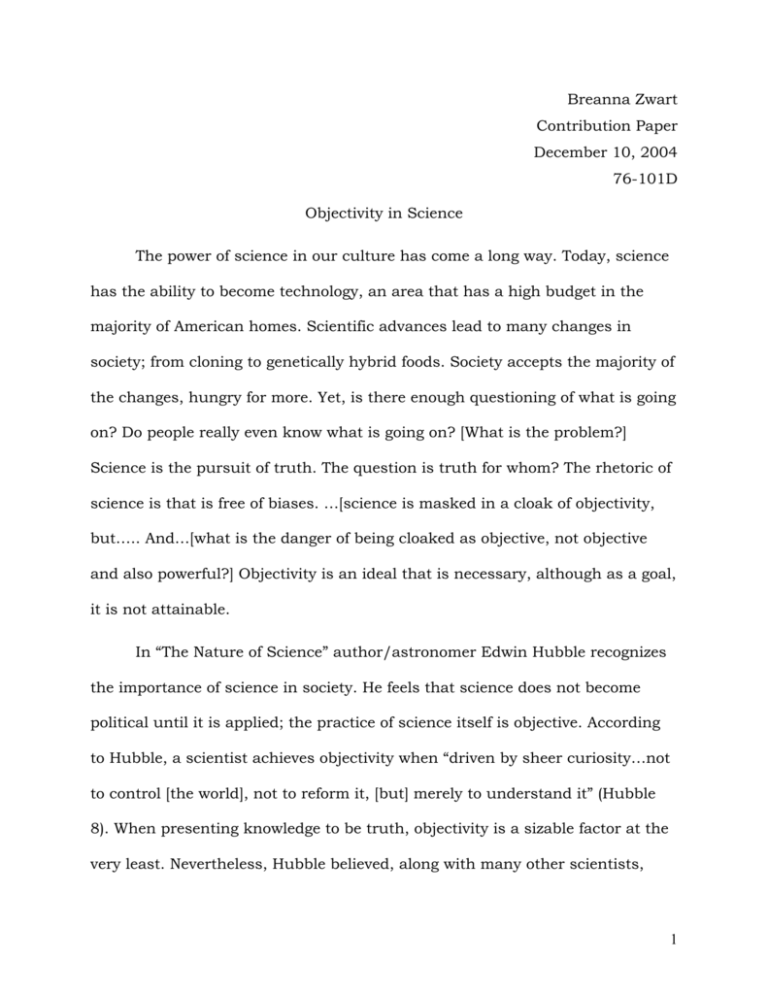
Breanna Zwart Contribution Paper December 10, 2004 76-101D Objectivity in Science The power of science in our culture has come a long way. Today, science has the ability to become technology, an area that has a high budget in the majority of American homes. Scientific advances lead to many changes in society; from cloning to genetically hybrid foods. Society accepts the majority of the changes, hungry for more. Yet, is there enough questioning of what is going on? Do people really even know what is going on? [What is the problem?] Science is the pursuit of truth. The question is truth for whom? The rhetoric of science is that is free of biases. …[science is masked in a cloak of objectivity, but….. And…[what is the danger of being cloaked as objective, not objective and also powerful?] Objectivity is an ideal that is necessary, although as a goal, it is not attainable. In “The Nature of Science” author/astronomer Edwin Hubble recognizes the importance of science in society. He feels that science does not become political until it is applied; the practice of science itself is objective. According to Hubble, a scientist achieves objectivity when “driven by sheer curiosity…not to control [the world], not to reform it, [but] merely to understand it” (Hubble 8). When presenting knowledge to be truth, objectivity is a sizable factor at the very least. Nevertheless, Hubble believed, along with many other scientists, 1 that objectivity is an attainable goal for science. [hold off on this: While objectivity is a worthy goal, it cannot be achieved. Nonetheless, the notion of objectivity should be retained to protect science from hijacking ideology and interest groups.] Despite the fact that Hubble is earnest in the above convictions, the reader must think of reality. The level of difficulty [the kind of separation from the social that] he demands from scientist[s] is mind-boggling [unrealistic]. Each human being has a belief system, a culture, values, judgments; they are the building blocks of your identity. In the article, “A Reasonable Skepticism” Richard Lewontin discusses science and its lack of objectivity. Subjectivity in science begins at science’s roots. “Scientists do not begin life as scientist, after all, but as social beings immersed in a family, a state, a productive structure” (Reasonable Skepticism 4). Scientists have lives and experiences that each scientist has his or her own paradigm of nature [I don’t understand this sentence—pls. rephrase]. The destruction of objectivity swells when one considers the person or groups that invest their time, money, and objectives into science. To think that projects in science are explored and funded for the purpose of curiosity in its purest sense is objectionable to say the least. A person must remember that “science is molded by society because it is a human productive activity that takes time and money and so is guided by and directed by those forces in the world that have control over money and time” (Reasonable Skepticism 3). 2 David Barnes discusses a pictorial model of knowledge that each person is born with in his article “The Problem with Knowledge.” [not born with but indoctrinated into] Having pre- conceived notions disrupts the possibility of any objectivity. [Rather than representing a correspondence with reality,] Barnes argues that the pictorial model is “constructed from conventions available as the resources of some culture or sub-culture” (Barnes, 4). The representations are not mirrored, but contrived from culture. Pictorial representations in science are like paintings; both are rely on conventions, “[i]ncreasingly, knowledge is being treated as essentially social, as a part of the culture which it is transmitted from generation to generation, and as something which is actively developed and modified in response to practical contingencies” (Barnes 2). How does one completely remove oneself from his or her environment/culture? In truth, you cannot. A person cannot be raised outside of society to be objective and devoid of all biases. [good!] The article, “Science Seen through a Feminist Prism,” written by Marion Namenwirth, agrees that that objectivity in science is not present. According to Namenwirth “because science evolved within a patriarchal society, it took on a decidedly masculine tone and became burdened and distorted by a pervasive male bias. Namenwirth defines science as a “system of procedures for gathering, verifying, and systemizing information about reality” (Namenwirth18). How can ‘information about reality” be true and objective when the majority of the people who validate the information are white males; the minority in reality. 3 The importance of recognizing the failure of science obtaining objectivity cannot be stressed enough. [why is this failure important?] In spite of this, objectivity must remain a value in science. Without the goal, the reaching, the stretching for objectivity, science would be in worse off. [revise] why? Bias can often begin in the laboratory when forming a hypothesis. According to Sir Francis Bacon’s scientific method, the hypothesis affects the procedure and ultimately the results. [thus? Explain…tell us how to guard against faulty hypotheses here…outsiders evaluate them?? Why necessary?] On a larger scale, maintaining objectivity as an ideal protects knowledge from being overtly motivated by particular and otherwise detestable social interest[s]. This type of behavior was written about in another article authored by Lewontin, “Dishonesty in Science.” This article articulates the Bush administration’s many wrong doings in the manipulating scientific findings “in the interest of its own ideological and political ends” (Dishonesty in Science 2). Such manipulations include “ the National Cancer Institute [being] directed to post a claim on its Web site that abortion promotes breast cancer although a large study had shown no such connection between them” (Dishonesty in Science 3). The Bush administration also suppressed scientific findings to “support a conservative religious ideology” (Dishonesty in Science, 3). This statement was made very clear when Lewontin discussed a situation at the Centers for Disease Control: ““In order to demonstrate that abstinence-only programs were effective, the Bush administration instructed the Centers for Disease Control not to follow 4 the actual birth rate for participants in an abstinence program. In order to hide the effectiveness of condom use in preventing HIV infection, the CDC was directed to emphasize condom failure rates in its educational material” (Dishonesty in Science 3). If the populace believes the results are objective and true, serious consequences will are inevitable. Without any discussion, without any type of checks and balances, authoritarianism ensues. [tell why the notion of objectivity is necessary, here] In “Nazi Politics and the Politics of knowledge” author Robert Proctor discusses that Nazi science was politicized to a degree. [explain this first] Another way to look at is that “Nazis depoliticized science by destroying the possibility of political debate and controversy” (Proctor, 353). [more on Nazi science first] Political debate around science was in clear view for the 2004 presidential election. When Ronald Reagan, Jr. spoke at the Democratic National Convention about stem cell research versus his own party’s convention, a loud statement was being made. Under the Nazi regime, however, discussions were silenced “[a]uthoritarian science… replaced what had been …a vigorous spirit of politicized debate in and around the sciences” (Proctor, 353). The Nazi regime was highly subjective and pursued science to “draw upon the imagery, results, and authority of science” (Proctor 355). Authoritarian science is one that is blatantly manipulated to support an ideology and smothered across society; it is science with no debate and no checks and balances. [you need talk 5 about how what is going in the contemporary is both like and unlike Nazi science…] In order to prevent dishonesty in science, objectivity has to be in an environment of debate. People have to be aware not only of achievements in the scientific community, but also of its failings. [failings cannot be judged as such without a notion of objectivity] A person must be aware that science, in addition to being a part of society, is carried out by humans, [who are social beings with interests, agendas, predispositions, etc.]. Thus, some type of bias and/or agenda should be suspected rather than complete acceptance. [fix this] On the other hand, if scientists’ claims are unquestioned, they may drape their scientific activities in claims of neutrality, detachment, and objectivity, scientists augment the perceived importance of their views, absolve themselves of social responsibility for the applications of their work, and leave their (unconscious) minds wide open to political and cultural assumptions. Such hidden influences and biases are particularly insidious in science because the cultural heritage of the practitioners is so uniform as to make these influences very difficult to detect and unlikely to be brought to light or counter balanced by the work of other scientists with different attitudes. Instead, the biases themselves become part of a stifling science-culture, while scientists firmly believe that as long as they are not conscious of any bias or political agenda, they are neutral and objective, when in fact they arc only unconscious. People need to rethink the definition of objectivity and how it is carried out in science. With the knowledge of objectivity as an unattainable goal, a person is more likely to contemplate news/claims from the scientific community. Knowledge “promotes a reasonable skepticism” which can lead to debate. The goal of objectivity and debate are two essential factors that will protect science and ultimately society as a whole against authoritarian science and abuse. 6 It is imperative to maintain objectivity as the ultimate goal in science and it is of equal importance to know that that goal will never completely be achieved. Science plays [is] a lead[ing] character in society today, which is why objectivity is needed to protect ourselves. People cannot be naïve and ignorant; knowledge is essential to survival. 7
